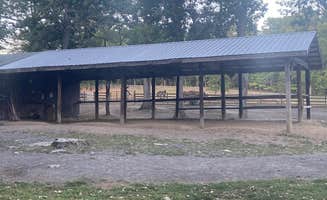Camping near Maysville, West Virginia offers outdoor experiences in a region where the Monongahela National Forest covers much of the landscape. The area sits at elevations ranging from 1,500 to 4,800 feet, creating diverse ecosystems and wildlife habitats. Night temperatures can drop significantly even in summer months, requiring proper gear regardless of season.
What to do
Hike scenic mountain terrain: Spruce Knob, the highest point in West Virginia at 4,863 feet, offers challenging hikes with unique vegetation. "There are at least 60-miles of trails in the surrounding Monongahela National Forest, including the very pleasant, 1-mile, Big Bend River Trail accessible from the campground," notes Jennifer B. from Spruce Knob Lake Campground.
Fish stocked waters: Several area streams are regularly supplied with trout. "The lake is stocked with trout several times a year. Electric motors only; No swimming allowed," shares Jennifer B. Nearby Gandy Creek offers another fishing option where campers report "The fishing is wonderful" according to Kristoff M. at Gandy Creek Dispersed Camping.
Explore remote forests: The region's dense forests provide opportunities for wildlife viewing and photography. "We have gone in the summer & fall, both very enjoyable," says Chris J. about camping at Trout Pond Recreation Area. During spring and fall migrations, the forests become especially active with birds.
What campers like
Dark sky stargazing: The lack of light pollution creates ideal conditions for astronomy enthusiasts. "You're in the middle of nowhere, so you do have a truly dark sky," reports Jean C. from Spruce Knob Lake Campground. The higher elevations provide clear viewing platforms on cloudless nights.
Stream-side camping: Sites adjacent to flowing water are particularly sought after. "We were lucky enough to get a site next to the river!" shares Nick E. from Gandy Creek. Similarly, at Big Run State Park, campers appreciate that "The best spots are in the woods adjacent to the stream. You can set up your camp chair and enjoy the creek sounds," according to Katie H.
Rustic solitude: The remote nature of camps offers peace rarely found in more developed areas. "It takes forever on dirt forest service roads to finally stumble upon this place, making its beauty that much more enchanting," describes Christopher B. about Laurel Fork Campground. The isolation means visitors often have trails and fishing spots to themselves.
What you should know
Limited services: Most campgrounds have minimal facilities and require self-sufficiency. "Make sure you have what you need because it's a long way to a spot to resupply!" advises Jean C. Many primitive sites lack running water or electric hookups.
Weather preparedness: Mountain elevations can experience rapid weather changes. "We did this hike in March and there was a thin layer of snow on the ground when we started that quickly accumulated while we hiked and then overnight as we slept," reports Emily S. about the Huckleberry Trail near Spruce Knob Lake.
Access challenges: Many campgrounds require driving on unpaved forest roads. "The drive to the campground is on a combination of narrow, winding, mostly unpaved roads. Go slow because there are plenty of blind curves," warns Jennifer B. Four-wheel drive vehicles are recommended during wet weather.
Cell service gaps: Communications are unreliable throughout the region. "Download your maps before you come, because there's no cell service and you'll truly get away," advises Jean C. The nearby Green Bank radio telescope restricts electronic emissions in parts of the area.
Tips for camping with families
Water play areas: Look for camps with accessible stream areas for children. At Big Run State Park, "The kids loved playing in the water. Very quiet and relaxing!" reports Andy C. The shallow creek beds provide safe wading opportunities.
Fishing ponds for beginners: Some locations offer stocked ponds ideal for young anglers. "The kids were able to fish for hours at the two fishing ponds, which both were stocked with bass and bluegill," shares Jason G. from Fort Valley Ranch, one of the equipped horse campgrounds near Maysville, West Virginia.
Amenities check: Verify bathroom facilities before booking with children. "Pit toilets were pretty clean. Stream was incredible and lively with trout and crayfish," notes Nathan S. about Big Run State Park. Some campgrounds only offer vault toilets without running water, requiring additional planning.
Tips from RVers
Site leveling: Mountain camping often means uneven terrain. "All the RV sites were impressively level, with only minimal leveling needed," reports Jason G. about Fort Valley Ranch, a notable horse-friendly RV campground close to Maysville, West Virginia.
Access road navigation: Check road conditions before committing to remote sites. "I was initially concerned about the road leading into the campground, as my rig is over 50 feet in total length. However, we were surprised that the winding roads presented no issues for us," shares Jason G. about traveling to The Cove Campground.
Power limitations: Know the electrical capacity before arrival. "It states online that it's only 15amp electric at 14 of their sites. Mid-August was a gamble as to weather," notes Laure D. about Trout Pond Recreation Area. Some campgrounds offer 30-amp service while others provide 50-amp connections, affecting what appliances can run simultaneously.


